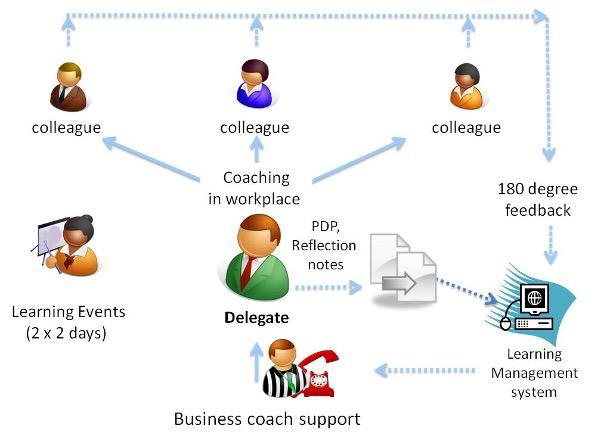CASE STUDY

RS Components (RS) is an electronic, electrical, and industrial distributor supplying a vast range of products to research and development or maintenance engineers.
The Context
RS Components (RS) is an electronic, electrical, and industrial distributor supplying a vast range of products to research and development or maintenance engineers. RS operates in 27 countries under the trading brands of RS Components and Allied Electronics. A further 38 countries also receive products, via a distributor network, resulting in coverage of around 90% of the world’s GDP.
RS is an organisation built on its ability to provide a high-quality service to its customers. RS employees have huge amount of pride in the company, its products and everything it stands for. The culture is historically paternalistic, people are – and expect to be – valued.
The Challenge
A need to respond to a rapidly changing operating environment
The global economic downturn of 2008 brought a new level of challenge for the RS organisation. Operating conditions became tougher as a general slowing of world trading increased the focus on meeting cost and revenue targets. In response, RS announced a restructuring programme to streamline the organisation and strengthen operational resilience.
Several factors needed to be addressed directly, to deliver change and continue to evolve an organisation fit for the future. Specific challenges included:
- The traditional, caring, ‘paternalistic’ culture was resulting in delays in decision making across an essentially matrix structure
- A desire for an increased sense of ownership and individual accountability, e.g. decisions were often escalated to senior managers and even the Executive Committee
- A need to develop internal talent and ensure the right leaders were in position to implement strategy and develop employees. This was resulting in increased costs of hiring externally to bridge gaps.
Develop Leadership and Deliver Change
RS’s leadership development strategy focussed on the following imperatives:
- For leaders to use coaching behaviours to manage performance, increase employee engagement and promote learning, e.g. during 1:1 meetings, performance reviews, career development interviews and appraisals
- To shift culture from a ‘parental’ style of leadership towards an empowering ‘adult to adult’ colleague relationships
- A need develop relationships within matrix reporting structures to strengthen collaborations and increase speed of decision making

The Solution
A robust development programme with practical application in the workplace
Starr Coaching were engaged to deliver a leadership development programme to help develop a coaching style of leadership. After more than 50 hours study, successful delegates would also gain a credible external accreditation that they would value as individuals. The programme targeted senior leaders including members of the Executive Committee; ensuring role models for coaching were visible from the very top of the organisation.
Specific objectives of the programme included:
- To give leaders a range of leadership coaching tools and skills pragmatic to their role
- To build coaching ability through increased self-awareness, receiving feedback, personal reflection, and direct experience.
- To challenge leaders by a programme with a higher-than-average level of commitment, e.g. self-study, personal coaching and assessment
The programme was not designed to create internal coaches; instead, it was for senior leaders to strengthen their skills through the integration of coaching into their everyday style.
A Supported Journey of Learning
The four- month long programme was a blend of the following methods:
- Self-assessment, (pre- and post-programme)
- Classroom study, (theory, demonstration & practice)
- Practice in the workplace, i.e. a min of three formal coaching relationships
- Telephone coaching by expert coaches
- Colleague feedback, via a competency-based questionnaire
- Reading and written reflection
- Formal assessment and accreditation
Personal Perspectives
The programme was a challenging time as delegates unpicked their own paradigms about how they led and the beliefs they had about people. Often the most challenging part of the programme was less the coaching practice and more the writing of personal reflection notes. Having to reflect on their leadership style and learning increased self-awareness in the workplace.
For many, the programme was a journey of self-discovery, challenge, and personal growth. Many leaders began the programme believing they were ‘coaching’ managers. Individuals quickly recognised their own behaviour and mindset was more directive and controlling of the people around them. This same directive tendency was also linked to issues of dependency, increased workload, stress, and a delayed decision making. Delegates quickly became engaged in the opportunity of coaching for them.
The Results
Engagement, ability, and a common approach
Quantitative feedback was gathered as part of the accreditation process and during employee engagement surveys. Further qualitative and anecdotal feedback was gathered after the formal accreditation, either as part of the appraisal process or through regular reviews.
The feedback indicated that:
- Colleagues were solving problems without automatically asking for direction; they were thinking for themselves and exploring creative solutions
- Engagement was increasing because of a less directive style of leadership
- Delegates felt more confident to have difficult conversations
- Speed of decision making was increasing, as leaders began to foster empowerment by ‘fixing’ issues less often and instead encouraging decisions from others
The business is embracing the concept of leadership coaching and real change is starting to happen. A second programme was as successful as the first and leaders are now pro-active in applying to join subsequent programmes. The opportunity to challenge their own behaviour and mindset, whilst gaining a professionally relevant qualification has broad appeal.
For RS Components, a calm sense of optimism grows. Reductions in operating costs have been achieved and recent sales trends are encouraging. A talented workforce, with a leadership driven to succeed are proving a winning combination. Whilst change is a recognised constant, leaders in the organisation are embracing coaching as a way of delivering results whilst developing people.
By Sara Wright, Organisation Development Manager, RS Components.
Further Information
- To discover how Starr Coaching can help you develop coaching behaviours in your workplace, get in touch, we’d love to hear from you.
info@starrcoach.co.uk

